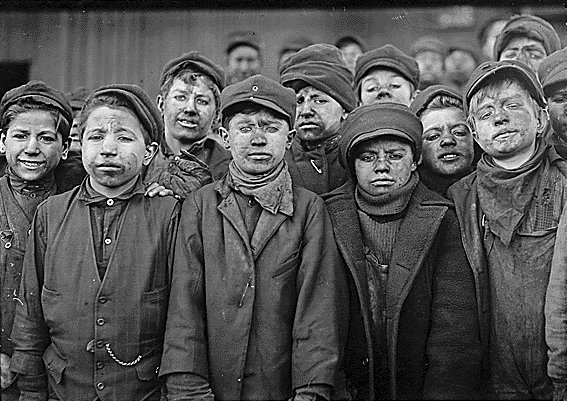David Russell Mosley

Ordinary Time
25 November 2016
The Edge of Elfland
Hudson, New Hampshire
Dear Readers,
At the beginning of November the Acton Institute (a Catholic institute that focuses on capitalism) ran a blog post entitled, “Bring back child labor: Work is a gift our kids can handle.” It ran in part as a response to pictures shared by the Washington Post of the horrors of child labor. It also ran in part as commendation of the article, “Let the Kids Work” over at the Foundation for Economic Education.
In both articles compulsory education is seen as something that ought to be abolished. Why force kids to go to school if they don’t want to? Put them to work instead. After all, as Jeffrey Tucker, author the FEE article, writes,
“But I also think about their inner lives. They are working in the adult world, surrounded by cool bustling things and new technology. They are on the streets, in the factories, in the mines, with adults and with peers, learning and doing. They are being valued for what they do, which is to say being valued as people. They are earning money.
“Whatever else you want to say about this, it’s an exciting life. You can talk about the dangers of coal mining or selling newspapers on the street. But let’s not pretend that danger is something that every young teen wants to avoid. If you doubt it, head over the stadium for the middle school football game in your local community, or have a look at the wrestling or gymnastic team’s antics at the gym.”
As Tucker, and the Acton Institute, would have it, we should abolish compulsory education in order to allow the youth who doesn’t want a life where he must learn to read or write or do basic math, to work instead. Never mind that to do most jobs today requires at least some basic education. Instead, look at these pictures of children who worked as newsies, or in coal mines, or factories. Sure they look dirty, Tucker says, but they must have felt so good knowing they were providing for the country. I mean, who cares if some were orphans working because there were few good social systems in place to care for young, abandoned children. Or if they had to work because their father was ill or hurt or gone and so they became the sole providers for their families as their mothers did what work they were allowed to do at the time.
Of course, what Tucker actually wants is not a return to children being forced into labor, but to work jobs at places like Chick-fil-a:
“All those photos dig deep into the past and conjure up weird dystopian scenarios, none of which have anything to do with today. If kids were allowed to work and compulsory school attendance was abolished, the jobs of choice would be at Chick-Fil-A and WalMart. And they would be fantastic jobs too, instilling in young people a work ethic, which is the inner drive to succeed, and an awareness of attitudes that make enterprise work for all. It would give them skills and discipline that build character, and help them become part of a professional network.”
Of course, this makes me wonder why even put this conversation in connection with late nineteenth and early twentieth century child labor? Why, if what you really want is for children, and actually not children but teenagers (never mind that many of the children in the photos have barely reached double-digits let alone their teens; one of them is of a 5 year old newsie), to work retail and fast-food do you put it in the context of child labor that was dangerous for the children. Tucker tries to get around this by pointing out that sure, life was worse in the 1900s in nearly every way, but the relationship between child labor and compulsory school has shifted too far. Children would be enriched by working low-paying jobs in big businesses that don’t necessarily add much to a local community.
Now here’s the thing, I’m not necessarily against letting children, particularly teens work. I have friends who farm or do sustainable gardening and their children participate in the work of the home. Children as young as three are allowed and encouraged to help with tasks such as chopping wood. These are good things. By all means, let’s teach our children skills, as well as teach them how to use and cultivate their imaginations, their language and math skills and more. In other words, unlike Tucker and the Acton Institute, whatever work we engage our children in, should be aided and complemented by actual, liberal education (and by liberal education, I mean the liberal arts).
What really confuses and even scares me about all this, however, is that it was endorsed by the Acton Institute. Now, really this was not a surprise to me. After all, the Acton Institute has certainly bowed down before the god of capitalism, but even I didn’t think it would sink this far. After all, I find it almost impossible to justify what Tucker and Acton are suggesting, particularly as they reference the photo montage, with this portion of the late nineteenth century papal encyclical, Rerum novarum:
“And, in regard to children, great care should be taken not to place them in workshops and factories until their bodies and minds are sufficiently developed. For, just as very rough weather destroys the buds of spring, so does too early an experience of life’s hard toil blight the young promise of a child’s faculties, and render any true education impossible. Women, again, are not suited for certain occupations; a woman is by nature fitted for home-work, and it is that which is best adapted at once to preserve her modesty and to promote the good bringing up of children and the well-being of the family.”
Now, some might be put off by the Pope’s words about women here, and we need to have real discussions about the differences between the sexes as it relates to work and the home. Too much focus on women in the home has led simultaneously to views that men are not competent to care for their children alone and that the man who stays home with his children is less a man than the man who leaves the home to work, and the reverse is true for women (ultimately I think the heart of this issue is that nearly all people need to leave the home at all in order to earn a living, but that’s a conversation for another day).
So, rather than focus on that, let’s focus on the brief statement about children. Ultimately the Pope’s point is twofold: First, children should not work at jobs that are too dangerous for them. We should not send 5 year olds out to sell newspapers. Young teens and pre-teens should not have to crawl through tight holes in coal mines nor into dangerous machinery. Second, children should be put to work until they are sufficiently ready for it in both mind and body. That is, they should be properly educated and physically developed before we send them to work. After that, presumably, all the other positions the Pope puts forward about the relationship between laborer and “master” ought to hold true.
How on earth, can a Catholic institute post something that flies in the face of Catholic teaching so blatantly makes little sense to this Protestant. In any event, I have no intention of trying to send my two-year-olds to get jobs cleaning tables at Chick-fil-a. I don’t know about you.
Sincerely,
David












